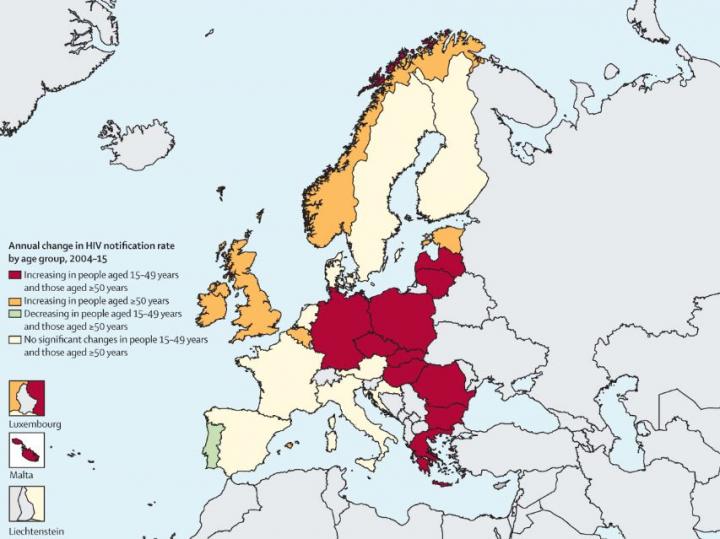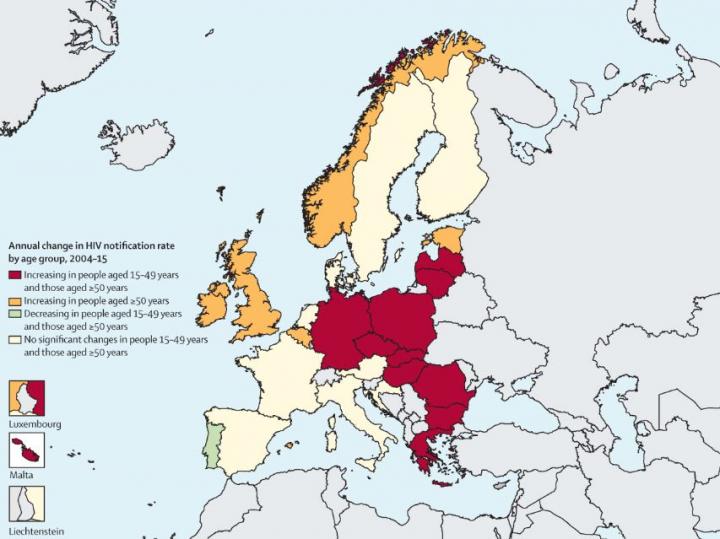
Credit: ECDC/The Lancet HIV
A study published in The Lancet HIV showed that while the rate of newly reported HIV cases in Europe remained steady in younger people between 2004 and 2015, it increased by 2% each year overall in older people. With around 30 000 newly diagnosed HIV infections reported each year over the last decade, the HIV epidemic remains a significant public health problem in the 31 countries of the European Union and European Economic Area (EU/EEA).
Based on data reported to ECDC between 2004 and 2015, 312 501 new HIV diagnoses were reported in younger adults (15 to 49 years of age) in the EU/EEA, resulting in an average reported incidence of new diagnoses of 11.4 per 100 000 population. During this 12-year period, 54 102 cases were reported among older adults aged over 50 years translating into 2.6 per 100 000 population. The rate of newly reported cases increased by 2% each year among older adults since 2004, when 3 132 diagnoses were notified in this age group. By 2015, around every one in six (17%) of newly diagnosed HIV in Europe were among people aged over 50, accounting for 5076 reported cases.
"Increasing new HIV diagnoses among older adults point towards the compelling need to heighten awareness among health-care providers and deliver more targeted prevention interventions for this age group and the total adult population", the authors said.
Late diagnosis among older adults at 63%
The study also showed that those aged 50 or older are more likely to be diagnosed late than younger adults with heterosexual transmission as main route of infection while sex between men is the main transmission mode among younger adults.
Despite increasing evidence of the benefits of early HIV treatment, 63% of the newly reported HIV cases (compared to 47% overall) in older adults were diagnosed late or presented with indication of advanced infection. This means that their immune system is already starting to fail and suggests persistent problems with access to, and uptake of, HIV testing and counselling in many countries.
The study findings suggest that the HIV epidemic is evolving in new directions which potentially is a result of low awareness of HIV and how it is transmitted among older people, which leads to misconceptions and low perception of their own risk of infection.
According to existing evidence, the most significant factor influencing testing patterns among older adults appears to be the active offer of an HIV test by service providers. The offer of HIV testing triggered by specific health conditions (i.e. indicator-condition guided testing) is a very effective and promising approach that could successfully target older adults if more broadly implemented.
Similarly, other promising approaches, which may warrant scaling up, are testing in primary health care or in emergency departments.
Diversifying and complementing testing opportunities is probably the best strategy to reach older adults. Testing in community setting and self-testing could be valuable additions to increase access and promote normalisation of HIV test among the older individuals and the adult population at large.
An update of the existing ECDC HIV testing Guidance is due for publication in 2018.
###
Media Contact
ECDC Press Office
[email protected]
46-858-601-678
@ECDC_EU
http://ecdc.europa.eu
Original Source
http://bit.ly/HIV50plus http://dx.doi.org/10.1016/S2352-3018(17)30155-8





